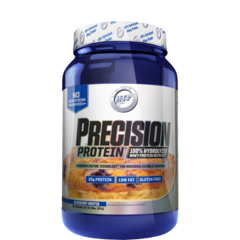
The Top 5 Myths About Hydrolyzed Whey Protein - Debunked!
|
|
Time to read 6 min
When it comes to fitness and nutrition, hydrolyzed whey protein often takes center stage. However, with its rise in popularity come misconceptions that can cloud your decision-making. In this article, we're setting the record straight by debunking the top five myths about hydrolyzed whey, and we'll unveil some lesser-known facts that might just make you consider this powerhouse protein for your regimen.
Hydrolyzed whey protein is often surrounded by myths that can dissuade many from taking advantage of its benefits. Let's dive deeper into these myths to truly understand what makes hydrolyzed whey a superior choice for many fitness enthusiasts and health-conscious individuals.
Myth 1: Hydrolyzed Whey Protein Is Just Fancy Regular Whey
It's important to recognize that hydrolyzed whey protein isn't just a "fancier" version of the standard whey. The hydrolyzation process, which breaks proteins into smaller peptides, isn't about being fancy; it's about efficiency and digestibility. For instance, a friend who always struggled with digestion issues after consuming regular whey found that switching to hydrolyzed whey eliminated those problems, showing that the benefits are real and can be felt on a personal level.
Furthermore, the peptides in hydrolyzed whey can lead to quicker recovery after workouts. This means less soreness and fatigue, which I noticed when I started using hydrolyzed whey in my post-workout regimen. Instead of feeling sluggish the next day, I felt more prepared and energized for my next training session.
Myth 2: It’s Only for the Pros
Hydrolyzed whey isn't reserved for elite athletes; it's beneficial for anyone looking to optimize their protein intake. This includes those who may not be able to consume as much protein through their diet alone. When my sister, a casual gym-goer, added hydrolyzed whey to her smoothies, she found that she was able to tone her muscles more effectively than with her regular diet.
Myth 3: Hydrolyzed Whey is Bad for Your Health
This myth couldn't be further from the truth. High-quality hydrolyzed whey is actually easier on the stomach due to its low lactose content. Plus, it's a pure protein source that supports not just muscle growth but also immune function and overall health. I have personally found that incorporating hydrolyzed whey into my diet has not only supported my gym efforts but also helped maintain my well-being during the cold season.
Myth 4: It Tastes Bad
The taste of hydrolyzed whey has come a long way thanks to flavor innovations. There are now countless delicious options on the market that can cater to any palate. I remember my initial hesitation due to this very myth, but after trying a chocolate-flavored hydrolyzed whey powder, I was pleasantly surprised by how enjoyable it was.
Myth 5: Hydrolyzed Whey Will Break the Bank
While hydrolyzed whey protein can be pricier than whey concentrate, it's all about perspective and priorities. Investing in a supplement that aligns with your health goals can be more cost-effective in the long run. Considering its high absorption rate and efficiency, you might actually end up using less protein overall. After making the switch myself, I found that the benefits I received were worth the extra pennies—my body thanked me for it with better performance and recovery.
The Bottom Line
Hydrolyzed whey protein is surrounded by myths, but the reality is it's an accessible, health-friendly, and efficient protein source for anyone. It's a premium supplement that can support a wide range of fitness and health goals, from muscle building to improved recovery, and it can fit into a variety of dietary needs. Whether you're a competitive athlete or simply someone who's active and health-conscious, hydrolyzed whey protein is a choice worth considering.
So, we invite you to put these myths to rest and consider incorporating hydrolyzed whey into your lifestyle.
What You Might Not Know About Hydrolyzed Whey Protein
Beyond debunking myths, there's more to hydrolyzed whey that meets the eye. For one, it's not just for muscle building. It's been shown to aid in weight loss efforts by helping maintain lean muscle mass which can keep your metabolism humming.
Additionally, hydrolyzed whey protein can be a boon for older adults. As we age, muscle synthesis begins to slow down. A highly digestible protein like hydrolyzed whey can provide the necessary amino acids to help maintain muscle health in the elderly.
How to Choose the Right Hydrolyzed Whey
Selecting the ideal hydrolyzed whey protein need not be an overwhelming task. It's all about knowing what to look for and understanding the value that this high-quality protein can add to your fitness and health regimen. Here are some detailed pointers to guide you through the selection process.
Check the Label for 'Hydrolyzed Whey'
Begin with the basics: ensure that the product explicitly states 'hydrolyzed whey' on its label. This distinguishes it from other types of whey protein, like concentrates and isolates. Hydrolyzed whey has undergone a specific enzymatic process that breaks the protein down into smaller segments, aiding in quicker absorption. If the label isn't clear, you might not be getting the fast-digesting benefits that hydrolyzed whey offers.
Minimal Ingredients Are a Plus
The fewer the ingredients, the closer you are to the protein's natural state. An extensive list of additives can sometimes overshadow the protein you're buying the product for. While flavors and sweeteners make the protein more palatable, they should not come at the expense of protein purity. Look for hydrolyzed whey that contains minimal added sugars, artificial flavors, or fillers.
Protein Content per Serving
Assess the protein content per scoop. A high-quality hydrolyzed whey product will typically offer between 20 to 30 grams of protein per serving. This ensures that you're getting a substantial protein hit with each shake, making it easier to meet your daily protein targets, especially post-workout when your muscles are in dire need of repair.
Brand Transparency and Reputation
Reputable brands will be transparent about their whey's origins and the hydrolyzation process. They may even provide third-party testing results to validate their protein's quality and purity. Check for any certifications that could indicate a higher standard of product, such as NSF Certified for Sport or Informed Choice. This can provide peace of mind that the product is free from banned substances and meets stringent safety standards.
Taste and Mixability
While not directly related to the nutritional content, the taste and how well the powder mixes with liquids can affect your overall experience. A hydrolyzed whey that clumps or tastes unpleasant can discourage regular use, undermining your nutritional goals. It’s worth reading customer reviews to gauge general sentiments around the product's taste and mixability.
Consider Your Dietary Needs
If you have specific dietary restrictions or preferences, such as being lactose intolerant or following a low-carb diet, ensure the hydrolyzed whey fits these requirements. Although hydrolyzed whey is generally low in lactose, checking the nutritional information for carb and lactose content will help you make an informed choice that aligns with your health needs.
Value for Money
Finally, compare the cost per serving among different brands. While hydrolyzed whey might be more expensive than other forms of whey protein, the price can vary significantly from one brand to another. Balance the cost with the quality of the product—sometimes spending a bit more can be justified by superior taste, mixability, and the peace of mind that comes from a trustworthy brand.
Choosing the right hydrolyzed whey protein doesn't have to be complicated. By following these guidelines, you can find a product that supports your fitness goals, agrees with your taste buds, and fits your lifestyle. Remember, integrating hydrolyzed whey into your diet is an investment in your health and performance, one that can yield dividends in muscle recovery and growth.
Conclusion
Armed with the truth about hydrolyzed whey, you’re now in a better position to make an informed decision about whether it’s the right supplement for you. Remember, the best approach to nutrition is a personal one, tailored to your unique needs and goals.
Join the Conversation
Have you tried hydrolyzed whey protein? Did you experience a notable difference in your performance or recovery? Or maybe you have questions about making it part of your fitness routine? Drop your thoughts and experiences in the comments below—we’d love to hear from you!
Remember, whether you're an athlete, a fitness enthusiast, or just someone looking to up their protein intake, hydrolyzed whey is a high-quality protein that's worth considering. So why not give it a try and see if it makes a difference for you?




